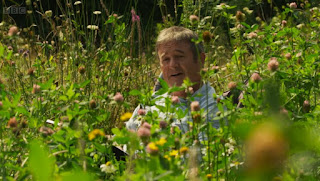
Colin Stafford-Johnson introduces us to his series The Wild Gardener Episode 4 and this is the final episode shown on BBC NI as this was shown as 4 episodes of 30 minutes.
BBC2 scheduled the series as 2 episodes of an hour .
'I've always loved wild places, places where nature's in charge' Colin says even though he grew up in a home with immaculate lawns and flower beds
This is because his Father was Television Gardener Barney Johnson and the family business was a Garden Centre and Plant Nursery.
Colin growing up, was always playing in the woods and the wild.
Colin is better known as a Wildlife Cameraman who now hoping to have his own wildlife to film at home.
On the East Coast of Ireland he is turning his own childhood garden into a wildlife haven.
Despite his background Colin is not a Gardener but he hoping his acre of ground can be brought back to life using only using native plants.
He has plans to dig a pond, plant woodlands and hedgerows, and sow wildlife meadows to attract as much wildlife and insects as he can to live with him in his very own Wild Garden.
The birds are tweeting and Colin says it is the first warm and bright day for a while, it will not be long until Spring explodes into life.
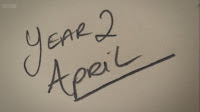
The Garden is full of Wild Garlic, Bluebells and Celandines which are all early flowers that come out before the tree leaves do.
This means they come up and flower very quickly to finish their life cycle in time.

This early on you never know how the year is gong to be so you have a real sense of anticipation of what is to come.
Colin is working on the newer smaller pond he dug next to the Cabin and although he has only just filled it up there are already beetles swimming in it.
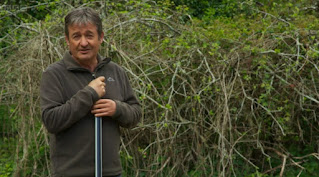
We switch to a clip from 'The Garden' with his Father Tv Gardener, Barney Johnson talking about a pond that had been neglected for 20 years but great to have a formal pond.
Rostrevor Co. Down
John Ross Mac Mathuna grew up on his families farm by the Mourne Mountains
He has always been passionate about wildlife and Nature and always tried to make space for it on the farm and at his own home.

He has always been especially interested in the Wild Flowers and Meadows so when he had a garden of his own he planted one to give the area back to Nature.
He loves the sound of the insects like the Crickets and can spend hours pottering around his garden escaping from the world.
Farming he takes very seriously as Farmers do as it is not just a business, it is also a Family home and a way of life.

The children are out helping with the bailing of some hay and are helping carry the bales into a trailer.
John says for his generation there can still be lower input lower output way of farming, so you are not producing as much but also not spending as much on things like fodder, fertiliser, diesel and time.
Every farm has unproductive corners or spaces and in 2000 when he was 18 he planted a little wood on such an area.
It been great watching it grow and John also keeps Bees so they benefit from the Tree Pollen and it is also a shelter for animals a well as free firewood when the branches fall.

In our expansion as a species you run out of space and look at any space as to what we can do with it but now the time to think what can we use it for to benefit the other species on the planet.

It's night time and Colin is looking at footage from his trail cameras he had in different positions in the Garden.
As he suspected some Deer have been coming into the Garden and as he watches more footage it turns out to be whole herd!
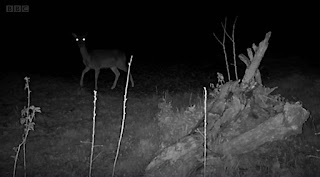
This is not such good news for his Hedge Saplings as the Deer have a nibble of the tender tops.
The 'little blighters' he loves watching the graceful way they move around and graze and its different here in the Garden as they have no predators unlike in the natural environment.
There has not been the howl of a wolf for a very long time.
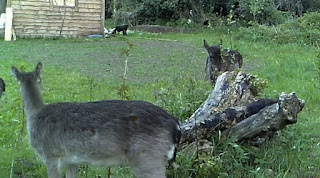
Colin decides he needs to walk around his fence to check for where they are getting in as he cannot have lots of Deer getting in, as the Garden is developing still.
It is the 1 year anniversary of the Dead Hedge Colin built and he is very pleased with it as it drops in height each year he will add more to the top.
All year there has been activity in the Dead Hedge from Birds nesting and the Bank Voles that moved in last year and now the Hedgehogs are using it.
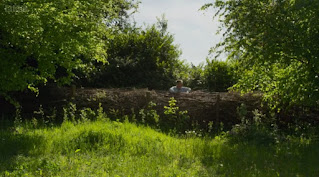
It is an instant habitat and so easy to do any so many creatures benefit from adding something like this to the Garden.
He spots some little Dunnocks that look like they are preparing to nest in the Dead Hedge.
Colin spent his childhood looking for birds nests in the Spring and he remembers finding a Dunnock nest and he saw the perfect blue eggs it was like finding treasure.

That was 47 years ago for Colin and he remembers it all so well as it was so special to him, thats what nature is, magic all around you.
Colin's Bee Hotel was very successful last year and loads of Mason Bees laid their eggs in the chambers of the Hotel.
He has opened it up to see how the next generation of Bees have faired over the Winter months.
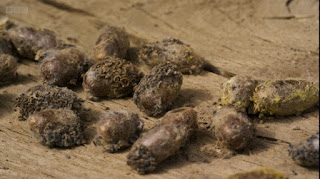
He has kept them safe from Parasitic Wasps who go after the cocoons and they have spent the Winter as Pupae as the cocoons were made at end of Summer last year.
He has taken them out of the tubes so he can watch the all male Mason Bees emerging and they will compete once the females emerge.
Male Bees are totally harmless and have white faces and do not sting and already there are a pair busy mating.
Other males try to knock him off the female but she decides who to mate with and as she is twice his size can just chuck a male off her if not happy with him.
Mason Bee Males lives are short lived and are about for 2-3 weeks in which they mate and then die.
The female straight away get to work gathering pollen for her young to feed on.

The Garden now has a complete Ecosystem for the Mason Bees they have pollen, a place to lay their eggs and mud to seal the pods with from around the ponds edge.
If they have all these they can complete their Life Cycle in a small area.
Bees are a very important part of the Garden and are under enormous pressure as with most of the insects they are losing habitat.

There are loads of open green spaces in towns and villages that could be used to create habitats for our insects as well as all the verges and hedgerows, next to roads.
Donna Rainey
Donna Rainey is part of a campaign to make these spaces wildlife friendly and she was inspired by her own garden.

Donna Rainey bought the house 21 years ago complete with its abandoned garden so she mowed the garden and it became a lawn again.
When she stopped mowing the dormant seeds sprang back into life and now the garden is her heaven, she absolutely loves it.
People become obsessed with having a very short cut lawn and any flowers stand no chance of appearing.

Donna has been involved in Don't Mow, Let it Grow with Causeway Council Project where they are managing the grasslands that used to be regularly mowed but are now left as meadows as well as some road verges.
They look lovely when you drive past and see all the Wild Flowers and the grasses knowing its not going to be mowed and destroyed.

It is a win-win as the council has a biodiversity policy too and we really need to think what we can do to stop the loss of these areas as well as Climate Change.
Biodiversity loss is a huge thing because if we lose our pollinators we lose a massive part of our food source so we need to stop getting rid of their food and provide more as it is so easy to do.

June is a time when there is life everywhere, all the insects, butterflies and everything is starting to arrive in the Garden.
In the ponds some of the plants are coming into flower, the Dragonflies and Damselflies are about to start laying their eggs.

The big meadow is really starting to look good with all the flowers emerging and he finding it so satisfying to have created a new ecosystem, a whole new world in his Garden.
The Red Squirrels have settled in to the Garden and he has been seeing them all the time and that leads to an even more exciting possibility for the Garden.
The trigger for the return of the Red Squirrels can be that Pine Martens are in the area and then the Red Squirrels follow.
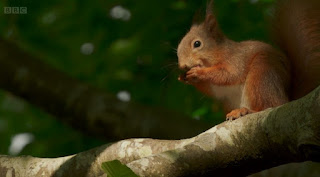
Colin is going to set up his trail cameras around the Apple trees to see if he has got any Pine Martens in the Garden as they would not turn down a feed on them.
As a boy Pine Martens were almost mythical as they only existed in tiny numbers in the west of the Country and he thought he would never get to see one.
When people stopped laying poisons this has helped the Pine Marten to return.

Colin is also smearing some Peanut Butter onto the trees to help attract them with its strong smell and hopefully if a Pine Marten will be passing.
Colin is excited at the thought that a Pine Marten may come to his Garden.

Colin has got what he has been waiting for, the Native Plant seeds are up and flowering and they have evolved over billions of years to cope with the climate and other hinderances.
Droughts, floods, ice they know how to survive it all and they look spectacular.
Red Clover, Devil's-Bit Scabious, Red Robin, Meadowsweet, Bird's-foot Trefoil and Crested Dog's-tail are all up and doing well.
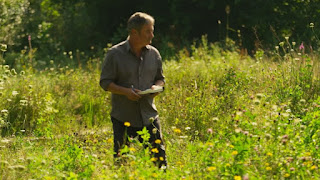
These beautiful plants have all grown in the wild and now they are creating a new world in his Garden.
It is just year 2 and the Meadow will only get better year on year as the Native plants win their positions and adapt as the garden matures.
Colin feels that something special is happening in this Garden as it takes shape.
There is about 36 species of Native plants in the Garden and they are all in flower.
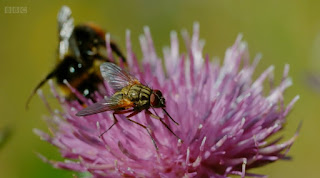
Knapweed is an amazing plant you can hear the Bees buzzing away on it and in 1 minute Colin has counted 15 different Insect species lading on it.
This is one of the plants that people get rid of but it is a beautiful plant.
The Yellow Rattle is doing very well, and as the Bees pollinate them they are securing their own future.
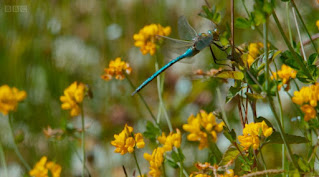
They will then go to seed and create more plants that keep the grass at bay making more room for even more Wild Flowers, so more food for the Bees.
The Garden is alive with the sound of humming, the sound of summer and the garden feels healthy.
In the past Colin would have thought of this garden as overgrown but they are supposed to flower and then set seed and you need to change your way of thinking, that this is not untidy.
The theme tune to 'The Garden' plays and Colin TV Gardner Father, Barney Johnson is in the suburbs talking about how miserable they are full of concrete and grim walls.

He has found an oasis amongst all the concrete with a lovely front Garden.
Colin says its a real turnaround for him to come from a traditional gardening family to where he is now sat in this Wild Garden, a 'complete mindset change'.
Back to Barney and he telling us foliage trees are more important than flowering trees in small places as they keep their leaves longer.
Colin says he would have the same mindset as him now if he was alive now and would have loved the Wild Garden.
He thinks its time for a big change, and he not expecting gardeners to get rid of their Roses but in the future their will be a progression towards more Native Plants.

If you are starting a new garden why not go Native from the onset?
Colin reward is being surrounded by all this life.
Colin has now spotted 16 species of Butterfly and today there were Red Admirals, Peacocks and Tortoiseshells feeding on the flowers and laying their eggs on the Nettles.
He loves watching them and knowing he created the right habitat for them to feed, breed and support the next generation.
It may just be less than an acre but Colin feels he created a whole new world.

He becoming known by his mates as The Wild Gardener but he says he 'an idle gardener' as when the sun is shining he like to relax and enjoy the garden.
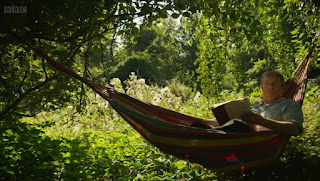
He comes here to refresh his batteries and relax which is different from when he was a boy when he spent most of it cutting lawns.
Colin looking at the footage from his wildlife cameras and is amazed to see a Pine Marten and he cannot believe there is one in his garden.
They are stunning and as a boy he dreamt about seeing one as it was so rare they were like mythical beasts.
They had been persecuted and poisoned into near extinction in Ireland.
More footage of them in the day time too and they are efficient predators so will change the countryside and we need them for the food chain.
Colin walking in the garden and says its funny to think a Pine Marten was here just last night in his woodland and its fabulous.
The return of their Native Mammal the Pine Marten will be the saviour of the Red Squirrel as they need them.

The Grey Squirrels came in from North American and do not know what a Pine Marten is and became their prey where the Red Squirrels know how to avoid them.
Pine Martens are at the top of the food chain and although he set up the garden for the smaller creatures having the top predator in the garden is just amazing.
Colin now at the end of his 2nd Season and from the mass of brambles it was, there is now so much life around him.
The 2 new ponds mean he has lots of Frogs, Newts, Damselflies and Dragonflies, the meadows are full of Bumble Bees, Grasshoppers and Hoverflies.
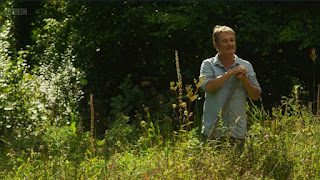
The Red Squirrels have been eating the Hazelnuts and the Hedgehogs are doing well which was the aim of the project to get as many Native Species to return to the Garden.
So many Native Plants are in trouble, so why not bring them into our gardens?
There are millions of gardens and anyone can do this small thing and make a connected nature reserve in our own back garden to other surrounding gardens.
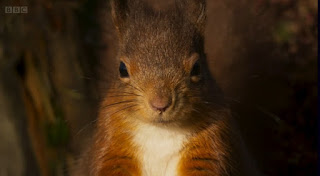
We should give Nature a chance and if we all shift our thinking we would make a more beautiful world.
This format of 4 episodes is as shown on BBC NI and may differ slightly than shown on BBC 2
All photographs are copyright of BBC.com



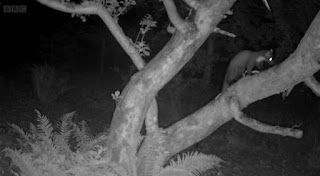
No comments:
Post a Comment